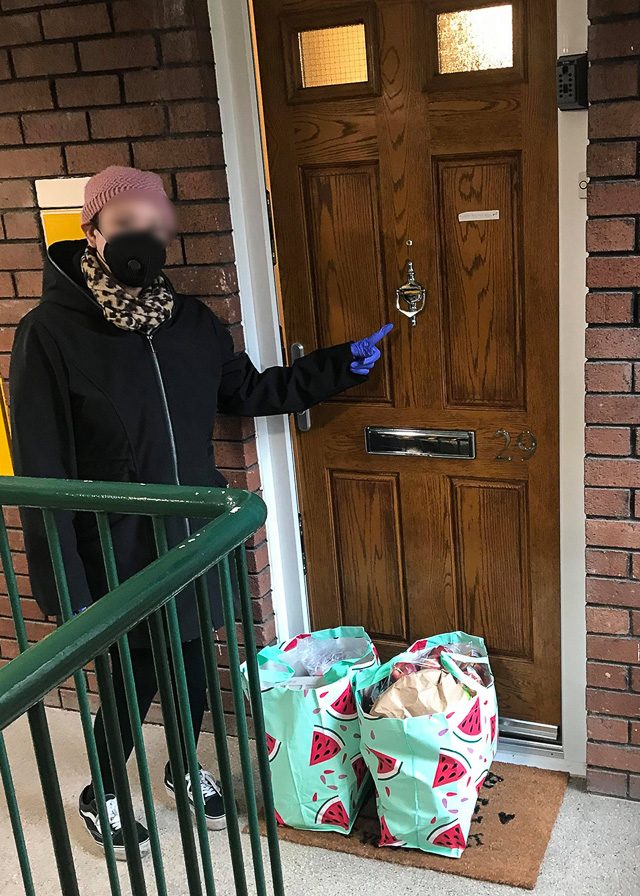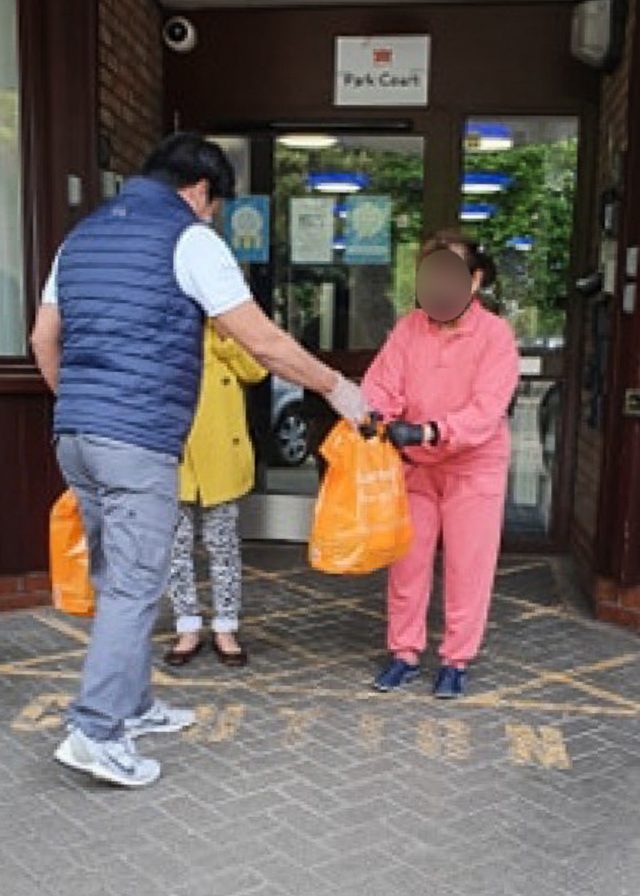SUMMARY
This is AI generated summarization, which may have errors. For context, always refer to the full article.

LONDON, United Kingdom – Imagine living in a wealthy country like the United Kingdom but finding yourself locked in a room, watching a loved one die because you could not bring him to a hospital for fear of a hefty bill or, worse, deportation.
This was the reality for an undocumented Filipino domestic worker in the UK who found herself widowed at home after her husband, identified only as Elvis, succumbed to the coronavirus in early April. Elvis, who was in his mid-50s and worked as a cleaner, was also undocumented. The couple have worked in the UK for 10 years.
Elvis died in the couple’s bedroom, his wife bearing witness, powerless to give him a fighting chance. It took more than 24 hours before the funeral home could take Elvis’s remains away. His wife mourned in silence – and alone.
To make matters worse, she was also infected with the coronavirus. Yet, she has not sought care from the National Health Service (NHS), the UK government’s public health system, according to Filipinos interviewed by Rappler.
Fear for her safety as an undocumented migrant trumps all the worries and concerns of Elvis’ wife. And hers is not a unique situation.
Support group
Susan Cueva from the Kanlungan Filipino Consortium, a registered charity comprised of several organizations aimed at looking after the rights and welfare of the UK’s Filipino community, said at least 50 undocumented Filipinos have sought their support should they fall ill from the virus.
“They (approached us) because they’re afraid. If something happens to them, nobody will help them because a lot of them are on their own. There are a few of them with families, but a lot of them are on their own,” she said.
According to the Philippine embassy here, as of April 20, the total number of reported COVID-19 cases for Filipinos in the UK is 119, including 47 deaths – 3 of which are undocumented migrants. There have been 18 recoveries. There is no data available on how many Filipinos are admitted in UK hospitals.
As of January 2020, there were approximately 200,000 Filipinos in the UK, according to the embassy.
Cueva said it is difficult to verify or prove that someone is undocumented unless he or she admits to it, but various estimates put the total number of undocumented Filipinos in this country at 10,000.
“The problem we have is that we have already accumulated quite a lot of undocumented migrants in the UK because of the changes in the (UK) government’s immigration rules over the last 10 years,” Cueva explained.
“So when they changed the domestic worker’s visa, which removed their right to apply for indefinite leave to remain in the UK, that has accumulated quite a lot of undocumented migrants among the domestic workers,” she said.
“They also removed and changed the rules around the care workers coming from non-European countries 10 years ago, where many of the care workers that we had at that time who came to the UK have lost the ability to apply for the extension of visa or indefinite leave to remain.”
Scare over jobs and health
Undocumented Filipino migrants have to contend with homelessness and going without income during the pandemic.
Many Filipino migrants without proper documents work in the informal sector. This means they do not have permanent or secured jobs or terms and conditions, and can be dismissed by employers without due process.
Since the UK implemented a lockdown in March, Cueva said some of those undocumented have also been rendered homeless after previously living with employers. She said it’s not uncommon for them to end up in crowded living spaces, sharing rooms to save costs on rent – which is unsurprising for those living in the UK capital of London, a city known for high rent prices – or sharing accommodation with Filipino health workers who are at the front lines of the COVID-19 pandemic.
Being undocumented in a pandemic makes health care a more pressing concern.
In the UK, the NHS, a publicly-funded healthcare system, provides free health care to anyone who is ordinarily a resident here, which means those who do not have the legal right to remain in the country must pay for health care.
There are exemptions to this, such as in accident and emergency situations. But Cueva said that since the pandemic took hold, there has been some confusion about where COVID-19 falls under, particularly for undocumented migrants who suspect they might have it.
The UK government recently updated its regulations to include COVID-19 in the list of conditions exempted from charges for migrants.
Despite this, the government guidance comes off as vague specifically where undocumented migrants are concerned – and gives no definitive assurances.
It called the attention of “all overseas visitors, including anyone living in the UK without permission,” to be aware that:
- No charges apply to testing for COVID-19, even if the result is negative, or to any treatment provided for COVID-19 if the result is positive – or up to the point that it is negatively diagnosed. The same applies for most other infectious diseases.
- No immigration checks are required for overseas visitors known to be undergoing only testing or treatment for COVID-19.
The Philippine embassy has highlighted the second point in its advice to Filipinos, including those undocumented.
“We continue to emphasize that the NHS will treat those who need their services the most without conducting a visa check,” the embassy said in a statement.
But costly medical fees aren’t the only concern for undocumented Filipino migrants if they walk into a hospital.
“There’s potential – because there’s still an obligation for health workers to report undocumented people accepting health services – that they might still be reported to the Home Office if they go to the hospital for illness or for treatment,” Cueva said. “So that’s really what’s keeping the community fearful of approaching the health services.”
Build a firewall
On April 17, 60 cross-party Members of Parliament (MPs) wrote to UK Health Secretary Matt Hancock to support a call to suspend all healthcare charges for migrants and stop immigration checks and data sharing among government agencies.
MPs said simply adding COVID-19 to the list of charging exemptions is insufficient. They urged the government to suspend all NHS charging and build a firewall among government agencies to ensure patient data will not be accessed by the Home Office and used for immigration enforcement.
They also called for an information campaign to make NHS staff and the wider public aware of the changes. There has been no reported official response to the letter as of this writing.
Housing Secretary Robert Jenrick was asked about the letter during the daily coronavirus press conference on April 18, and he emphasized the status quo in government policy.
“I have heard a number of representations about those people who do not currently have recourse to public funds, who’ve come in an undocumented way from other countries. The government’s policy on that hasn’t changed,” he said. “But there is the ability for local councils to make sensible decisions based on the risk to life that there may be in a small number of cases.”

Grant them legal rights
Kanlungan wrote an open letter to MPs and launched a petition calling on the government to grant undocumented migrants the legal right to remain in the UK.
This is also part of a wider and more long-term campaign that includes building a broader coalition with other organizations to bolster support. Cueva noted they have had successful regularization campaigns in the past for undocumented domestic workers and care workers and hope to carry this through again now.
To address urgent concerns over the coronavirus, Kanlungan, along with two other organizations, submitted a document this week to the Home Affairs Select Committee outlining how all migrants could avail of NHS services and not be made victims of data sharing of agencies. The committee with cross-party MPs will then make recommendations on their demands, which Cueva expects to receive in the coming days.
Cueva said they are also lobbying for MPs to sponsor and put in a question straight to the Prime Minister in one of the weekly Prime Minister’s Questions sessions, which returned this week in a virtual format, about granting legal rights to undocumented migrants.
“Our call is really for the UK government to give legal status to all undocumented migrants and refugees in the UK at this time of the pandemic because it’s a public health issue and it’s also a humanitarian issue,” said Cueva. “If they give legal status they then will not have anymore the fear of coming forward when they are ill.”
“I think it’s just right that the government should do that because otherwise they’re committing really manslaughter in allowing these people to die without support and help,” she added.
Follow Portugal, Ireland
Measures requested by the MPs and Kanlungan are similar to steps some European countries have taken to protect migrants.
For instance, Portugal granted temporary full citizenship rights to migrants and asylum seekers during the outbreak, while Ireland put up a firewall so patient information will not be shared to enforce immigration law on the undocumented.
But years of living in perpetual apprehension is difficult to shake off for undocumented Filipinos.
“The fear in the community is very strong,” Cueva said. “They always try to say, ‘I’m going to get better so I’d rather not risk being reported if it’s not COVID.’ And so for them they still think about the families that they are supporting in the Philippines.”
Kanlungan, through donations, offers support through grocery deliveries, while volunteers help with accommodation for those who have been homeless.
“They do not admit to them they are undocumented, they do not admit the pain and suffering they experience in the UK because they don’t want their family members to be worried about it,” Cueva said.
“There’s still a lot of stigma in our community about being undocumented. If you’re undocumented they assume that you committed something wrong and you did something illegal, which from our point of view as an organization, that’s not how we look at it. Something is committed against them by the UK government when they changed different rules, which made them undocumented.”
And it is a community that belongs to a bigger Filipino force that’s an asset to UK society.
Filipinos account for the third biggest group of NHS staff behind the British and Indians, with close to 19,000 of them working as medical professionals, nurses, allied health professionals, or as support staff, according to an NHS diversity report from March 2019 cited by the Philippine embassy.
Data on deployments in 2018 from the Philippine Overseas Employment Administration indicated that nurses account for 97% of the more than 2,300 deployed OFWs to the UK.
Now if only this pandemic could legalize the stay of thousands more. – Rappler.com
To make a donation to the Kanlungan Filipino Consortium, follow this link.
If you’re a Filipino in the UK in need of assistance, you may contact the Philippine embassy via email through london.pe@dfa.gov.ph or call through the Assistance-to-Nationals hotline at (+44) 78 0279 0695.
Add a comment
How does this make you feel?
There are no comments yet. Add your comment to start the conversation.